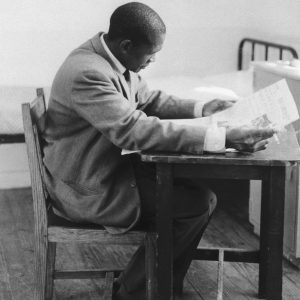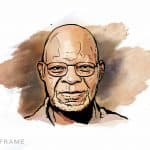From the Archive | Samora Machel on Marxism
In this address given in the former German Democratic Republic at the 100th anniversary of Karl Marx’s death, Mozambique’s first president discusses Marxism and its relevance to his nation.
Author:
27 May 2021

Samora Machel was a commander in the Frente de Libertação de Moçambique, which fought for Mozambique’s independence from Portuguese rule and won in 1975, with Machel as its first president. His government quickly nationalised all the land and health and education institutions. In 1986, Machel died in a controversial plane crash.
This lightly edited address was given on 11 April 1983.
Dear comrades, with deep feeling we greet this august assembly where representatives of the forces of progress and socialism, from all continents and peoples, from all races and nations, are together celebrating the centenary of the death of one of mankind’s most beloved sons, Karl Marx.
The men and women who accompanied Marx at his burial in a London cemetery were few. Today the lives of thousands of millions of men and women have been profoundly affected and changed by the enduring ideas of Marx. In four continents, workers, taking control of their destiny, are building a happy future, are building socialism, communism.
Against Marxism, against Leninism, which is our epoch’s Marxism, imperialism mobilises incalculable human and material resources. The most sophisticated weapons, the threat of thermonuclear, bacteriological and chemical disaster, the ocean depths and cosmic space are deployed in an attempt to neutralise and destroy Marxism-Leninism.
The spectre that haunted the bourgeoisie in Europe 100 years ago still haunts them, but now it is perceptible throughout the world.
Related article:
For the oppressed peoples and classes, for the peoples and workers who have taken control of their destiny, Marxism is a shining path, a sun of hope and certainty that never sets, a sun that is always at its zenith.
Marxism, the science of revolution, is the fruit of practice, of mankind’s struggle for a better future and so is renewed and developed through human practice. The experience of revolutionary struggle of the Mozambican people provides an illustration of this principle.
Dear comrades, our history validates the thesis that the motive force of history is class struggle. Class struggle was and is a reality on the African continent.
Our pre-colonial society was familiar with complex state formations, such as Monomatapa and Gaza. They were political and social systems of a feudal type, at differing stages of development. In some there survived elements of earlier slave systems. In others there were already emergent mercantile strata which, in another phase of history, would come to shape a new evolution in society. In all of them there was a distinction between exploiters and exploited.
Colonial repression of these state formations and the integration of society into the capitalist and imperialist system, which was emerging in the era, brought new historical changes.
The antagonists within the society facilitated colonial occupation. Representatives of the exploiting strata betrayed the national cause and made an alliance with the foreigner to continue the domination and exploitation of their own people. Once the country was conquered the betrayers of the nation were also subjected to domination, since they in turn were betrayed by their erstwhile ally.

Colonial conquest, by introducing a system of large plantations and landholdings, exploitation of minerals and the building of railways and roads, began the process of proletarianising the countryside.
Our country’s liberation struggle arose as a consequence of the contradiction between colonised and colonisers, between exploited and exploiters. Reformist patterns of nationalist pressure were precluded by the very nature of colonial-fascism.
It was legally impossible to establish Mozambican social organisations and even less a nationalist party or a trade union. There was no earthly hope of dialogue with the colonial power to lead to self-determination, much less to independence.
The historical alternative for our people was recourse to revolutionary violence to put an end to fascist violence. The Marxist thesis of making war on war to achieve peace reveals its correctness once again.
In the founding of the Mozambique Liberation Front it was essentially plantation workers, poor peasants subjected to forced labour, who provided the social base for the organisation.
Related mixtape:
In the process of armed struggle for liberation, liberated areas were created. We had to determine in practice what power to establish in the areas. With the production of material goods, basic questions presented themselves in an acute form. It was a question of understanding whom the struggle served, since former feudal and new exploiters, aspirants for bourgeois status, wanted to establish their power over the people.
The conflicts experienced in the Liberation Front in the period 1967 to 1970 were, above all, class conflicts.
Out of the correct solution of the conflict a qualitative advance was made by the Mozambican revolution. Once again class struggle was revealed as the cause of advances in history.
The creation of liberated areas made viable and current the issues of property and power, and brought as an ingredient in the claim for independence the question of the social regime to be set up.
That is how in the process of class struggle, within the Front and in the liberated areas, the seed was sown of the Marxist-Leninist party, of the socialist revolution, of the people’s democratic state.
There was an acceleration in the revolutionary process. An acceleration of the movement towards socialism, even though the working class was weak in size and in awareness of its class interest.
Related article:
The war situation acted as a powerful catalyst which, thanks to political work, encouraged understanding of the real aims of the conflict. An awareness of the great sacrifices that were demanded stirred in the society a felt need for radical changes in its internal relations.
The accumulated experience of mankind in the struggle against exploitation, synthesised in Marxism, enabled the Mozambican revolutionary movement to benefit from and absorb that experience. In the process Marxism was enriched.
Under Mozambique’s conditions, revolutionary practice led us to give pride of place to socialist revolution, and led us to launch the process of building socialism in a context of widespread illiteracy, a narrow working class and in the absence of an established Marxist-Leninist party. The struggle by Mozambican workers, under the leadership of the vanguard nucleus generated by the Liberation Front, enabled us to find correct responses to these problems.
In this sense, although each people’s revolutionary experience is specific, it does not lie outside Marxist thinking.
Related article:
Dear comrades, this description in synthesis of the main strands of our experience has led to some essential conclusions. A first conclusion indicates the universality of class struggle, of contradiction as the motive force of history. A second shows the leading and decisive role of working-class ideology in the correct solution of conflicts prevailing in present-day society.
Even in those countries with a weak industrial base, such as we have, the rule still holds that socialist revolution is possible.
It has triumphed in Mozambique with the victory of the people’s war of liberation. It has triumphed in the sense shown by Lenin, as a correlation of forces, as a determination to build socialism, since with the people’s support the interests and concepts of the proletariat have been placed in control.
Marx’s thinking demonstrates that it is vitally important to settle the question of where power lies, who wields power.
The dictatorship of the proletariat is as alive today as at the time of the Commune. State action depends on it in the long and complex process of transforming social relations, in establishing a material and scientific base, in educating man. Such state action and the broad management of society require the organisation of the workers’ vanguard into a party equipped with the scientific ideology of the proletariat. So, at the Third Congress in 1977, our Marxist-Leninist Party was born from its embryo in the Front.
Related article:
Dear comrades, internationalism, unity of the exploited of the earth, is one of the basic constants in Marx’s thinking. In our own time, in the face of imperialism’s mounting aggressiveness, it manifests itself in the need for closer and closer union between the components of the contemporary revolutionary movement. Internationalism in our era acquires an extra dimension, with the need to struggle for peace and against nuclear catastrophe.
We are witnessing today an uncontrolled arms race, we see imperialism’s insistent efforts to deploy its weapons of mass destruction in various parts of the world. We are witnessing today the growing support imperialism gives to the most retrograde forces of mankind, to fascist and Nazi regimes that oppress, exploit and massacre the working classes.
These actions by imperialism are meeting growing resistance from peace- and progress-loving peoples, in the light of the unbreakable determination of the workers of the world to thwart such actions.
In the struggle for peace it is Marxist forces who must lead mankind’s struggle for survival. The broadest front has been built around this struggle.
Leading figures in science, art, religion, institutions of every kind, youth, women’s and church bodies, all honest people with respect for mankind join with the political forces that demand peace.

In this respect we salute the initiatives by the Warsaw Pact consultative committee, in expressing the desire of peoples for peace and in offering realistic and just answers to the problem of avoiding the spread of war or a nuclear catastrophe.
The struggle for peace must prevent the causes of war.
Imperialist exploitation and an unjust international economic order are a cause of war.
The imperialist policy of destabilisation and aggression against states that refuse to submit to imperialism and that embark on the road of revolutionary change is a provocation to war. Economic, financial and military blackmail, provocations against socialist states in Europe, Asia, Latin America and Africa are factors for war.
The belligerent policy of Israel and of South Africa, cherished allies of imperialism in their regions, is a provocation to war. Racism, apartheid, Zionism, occupation of foreign territory, colonial expansionism are factors for war. Local wars, promoted by imperialism, may lead to all-out war.
The Pretoria regime in southern Africa is a cause of war that represents a threat to peace in the whole region. The Nazi-fascist regime in Pretoria occupies some of the territory of the People’s Republic of Angola, colonises Namibia, encourages armed banditry in Mozambique, Angola, Zimbabwe, Zambia and Lesotho. The apartheid regime is responsible for the war situation that prevails in southern Africa and threatens to provoke an all-out war.
Mozambique’s independence was the contribution made by the Mozambican people to the struggle for peace. Today, in association with other southern African countries for the purposes of regional economic cooperation, and in concerted action to prevent the real danger of war already posed by the apartheid regime, we have established a significant front in the struggle for peace.
Related article:
In the struggle for peace. which of necessity entails a struggle against apartheid and against colonialism, the ANC and the South-West Africa People’s Organisation are the favoured instruments of the peace movement in southern Africa.
This just struggle has the unfailing support of the socialist countries, of the Front Line states, of progressive and democratic forces, of all peoples who seek peace, freedom and progress.
The struggle for peace, as a people’s movement, has to acquire this scale. It is precisely the scale that Marx made universal in his thinking and action.
Dear comrades, a century after the death of Marx, the cause of socialism and communism has ceased to be a dream and has become a reality that changes the world. The vitality of revolutionary science, systematised by Marx, can have no better proof than the facts themselves.
The socialist countries assert themselves and advance. The overall record of socialism is one of great success. The experience of socialist revolution, of socialist construction, is overall an enrichment and constant broadening of Marx’s original teachings. Each country and each revolution makes a new contribution to the development of our science, of our heritage.
We are celebrating this centenary in the German Democratic Republic (GDR), a Germany in which socialism has triumphed. A Germany where working man continually manifests the breadth of his intelligence, his energy, his ability, by creating prosperity, progress and happiness. A Germany in which militant internationalism makes the struggle by peoples against exploitation its own struggle.
Related article:
We salute through Comrade Erich Honecker, general secretary of the Central Committee of the Socialist Unity Party of Germany, the workers – labourers, peasants, revolutionary intellectuals – who have been able creatively to transform the genius of Marx into an invincible material force, for the triumph of socialism and peace.
We salute the working classes in the GDR, who, led by their vanguard party, have so magnificently organised this assembly of representatives of workers of the world, as an affirmation that Marx’s thinking, still alive and still young, is immortal.
With the concepts of Marx, the peoples of the world will triumph in their just struggle for peace, for progress, for socialism.
The struggle continues!
The revolution will win!
Socialism will triumph!







